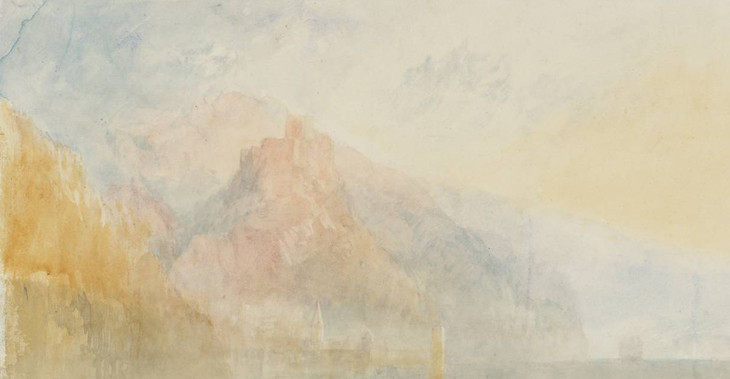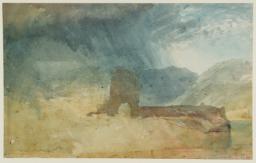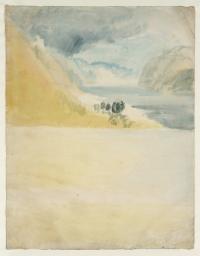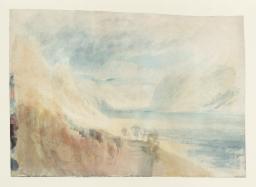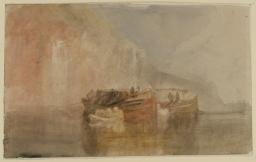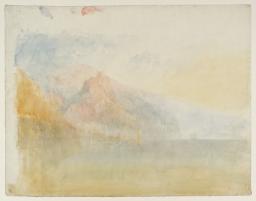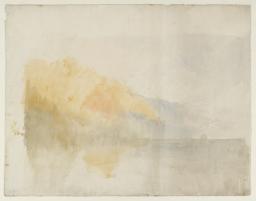From the entry
This small section comprises ‘colour beginning’ for a group of early 1820s watercolours of German subjects; for a discussion of the function of such preliminary studies in general, see the Introduction to the ‘England and Wales Colour Studies c.1825–39’ section. The three sites depicted here lie along a twenty-mile stretch of the River Rhine, and were visited by Turner on his August–September 1817 tour of Belgium (including the battlefield of Waterloo), Holland and the Rhineland, as addressed by David Blayney Brown in an earlier section of this catalogue. The immediate results of that tour were the drawings Turner sold in the autumn of 1817 to his close friend and major patron Walter Fawkes of Farnley Hall near Leeds (as discussed in the Introduction to the ‘County Durham and Northumberland 1817’ section). These were fifty or fifty-one rapidly completed Rhine watercolours of varying degrees of finish, and since dispersed to many public and private ...
This small section comprises ‘colour beginning’ for a group of early 1820s watercolours of German subjects; for a discussion of the function of such preliminary studies in general, see the Introduction to the ‘England and Wales Colour Studies c.1825–39’ section.1 The three sites depicted here lie along a twenty-mile stretch of the River Rhine, and were visited by Turner on his August–September 1817 tour of Belgium (including the battlefield of Waterloo), Holland and the Rhineland, as addressed by David Blayney Brown in an earlier section of this catalogue.
The immediate results of that tour were the drawings Turner sold in the autumn of 1817 to his close friend and major patron Walter Fawkes of Farnley Hall near Leeds (as discussed in the Introduction to the ‘County Durham and Northumberland 1817’ section). These were fifty or fifty-one rapidly completed Rhine watercolours of varying degrees of finish, and since dispersed to many public and private collections,2 which were apparently bought as a set for £500.3 Turner worked from his Continental sketchbooks, basing the compositions on drawings in the Itinerary Rhine Tour, Waterloo and Rhine and Rhine books (Tate; Turner Bequest CLIX, CLX, CLXI).4
In February 1819, Turner made and agreement with the engraver and publisher W.B. Cooke (who worked with him on a number of projects5) and the engraver J.C. Allen, for the delivery of ‘Thirty Six Drawings on the Rhine’ to be published in due course.6 The project was abandoned owing to the coincidental launch of Rudolph Ackermann’s 1819–20 series, A Picturesque Tour along the Rhine, from Mentz to Cologne (also issued as a book in 1820), with engravings after M. Schütz and an English translation of Baron von Gerning’s 1818 text.7 Nevertheless, Turner made at least eight new watercolour versions of the 1817 compositions for a variety of patrons, including some in Fawkes’s circle.8 D25242 and D25304 (Turner Bequest CCLXIII 120, 182) are colour studies for one of them, Burg Sooneck with Bacharach in the Distance of about 1820 (Aberdeen Art Gallery).9
The artist was evidently considering another version of the 1817 Boppard (Yale Center for British Art, New Haven)10 at this time, perhaps for Cooke’s project, but assuming it was ever made so it is now untraced and D25382 (Turner Bequest CCLXIII 259) is the only evidence of his intention. A third subject of the early 1820s, Kaub and the Castle of Gutenfels (private collection),11 was developed independently of the Fawkes designs, and is represented here by two full-scale studies (D25511 D25512; Turner Bequest CCLXIII 387, 388) and another focusing on the group of Rhine boats in the foreground (D25438; Turner Bequest CCLXIII 315).
See also Eric Shanes, ‘Beginnings’ in Evelyn Joll, Martin Butlin and Luke Herrmann (eds.), The Oxford Companion to J.M.W. Turner, Oxford 2001, pp.21–3; among many other accounts, see also Andrew Wilton in Martin Butlin, Wilton and John Gage, Turner 1775–1851, exhibition catalogue, Royal Academy, London 1974, p.26; and Andrew Wilton, J.M.W. Turner: His Life and Work, Fribourg 1979, p.187.
Wilton 1979, pp.374–9 nos.636–86, mostly reproduced; the disputed work, Wilton no.678, is larger and on different paper and may date from around 1819–20: see Evelyn Joll in [Kate Oldfield (ed.)], Agnew’s 1982–1992, London 1992, p.162, as cited and discussed in Cecilia Powell, Turner in Germany, exhibition catalogue, Tate Gallery, London 1995, pp.101–2.
See Alexander J. Finberg, The Life of J.M.W. Turner, R.A. Second Edition, Revised, with a Supplement, by Hilda F. Finberg, revised ed., Oxford 1961, p.250; Wilton 1979, p.374; Cecilia Powell, Turner’s Rivers of Europe: The Rhine, Meuse and Mosel, exhibition catalogue, Tate Gallery, London 1991, p.32; Powell 1995, p.27.
See Gillian Forrester, ‘Cook, William Bernard’ in Evelyn Joll, Martin Butlin and Luke Herrmann (eds.), The Oxford Companion to J.M.W. Turner, Oxford 2001, p.63.
Transcribed in full in John Ruskin’s Dilecta: see E.T. Cook and Alexander Wedderburn (eds.), Library Edition: The Works of John Ruskin: Volume XXXV: Præterita; and Dilecta, London 1908, pp.595–6; and in Powell 1991, p.35.
See Wilton 1979, p.374, Diane Perkins, The Third Decade: Turner Watercolours 1810–1820, exhibition catalogue, Tate Gallery, London 1990, p.35, Powell 1991, pp.35–6, and Powell 1995, pp.28–9.
Wilton 1979, pp.379–80 nos.687–693, p.490 no.689a, all reproduced; see Powell 1991, p.107, and Powell 1995, p.28.
How to cite
Matthew Imms, ‘Colour Studies for River Rhine Watercolours c.1819–24’, July 2016, in David Blayney Brown (ed.), J.M.W. Turner: Sketchbooks, Drawings and Watercolours, Tate Research Publication, February 2017, https://www

